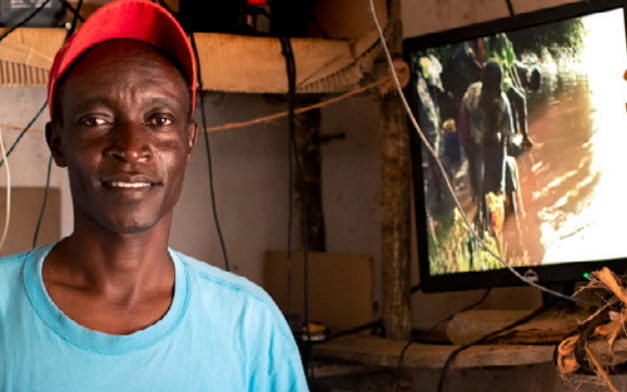Humanitarian settings are often located in regions with poor infrastructure and limited access to electricity. Host governments can be reluctant to invest and build sustainable infrastructure in these areas, as they are seen as temporary solutions. But often, these shortterm solutions can turn into a longer-term⁵ living situation, resulting in people living in the camps for years or even decades (1).
In such settings, short-term off-grid energy alternatives like diesel generators, which are expensive and environmentally harmful, are often used to supply electricity. UNHCR spends more than USD 35 million annually (2) on diesel fuel to provide electricity to refugee camps, predominantly for powering its own operations to provide critical services. Yet 94% of displaced people in these refugee camps still lack access to electricity (3). An estimated total of USD 10 billion (4) is required to cover all refugee energy needs globally between 2022 and 2030.
In regions lacking reliable conventional grid infrastructure, off-and weak-grid technologies can serve as dependable energy sources. To encourage more appliance companies to operate in this sector, it is vital for these companies, humanitarian organisations, governments, financial institutions, and community groups to collaborate (5).
Our research aims to provide insights into the current level of engagement of appliance companies within the humanitarian energy sector. Notably, this narrative represents the perspective of appliance companies and does not reflect perceptions or viewpoints from the end users.
Challenges faced by appliance companies
Affordability is the biggest challenge for appliance companies to serve the humanitarian energy sector. Larger appliances, such as refrigerators/freezers or solar water pumps, often come with high upfront costs. In many humanitarian settings, access to formal financial services like credit or loans is limited for displaced people, making it even more difficult for customers to pay for these appliances. While PAYG is a promising solution to address the affordability constraints, only three of the 12 surveyed companies currently offer appliances on PAYG.
Another major challenge is the limited access to financing to manage the perceived risk of engaging in the humanitarian energy sector. A service provider based in Uganda reported: “The ecosystem needs more support from financiers to develop a market for microfinance institutions/technology suppliers such as providing the incentive to operate remotely and/ or guarantees in place. Otherwise, the communities/developers will continue depending on subsidies which is not sustainable”.
There is limited grant funding available, and it is difficult for companies to access these funds as they are often underpinned by an extensive application process. Very few among the smaller companies have the resources to invest in a detailed application process, especially given that there is no certainty of securing the funding.
Similarly, a lack of distribution channels and limited local presence/capacity is a major roadblock for many appliance companies, especially for companies that do not have an office or team in or near the humanitarian setting. In addition, there are challenges associated with “poor communication and transport infrastructure”. A vertically integrated company supplying appliances in Mali reported: “It is difficult to deploy a team on the refugee side, costs more money to operate. The cost of the project goes up. We have a mobile application, and we send 2-3 staff to the ground to collect the data on people who are interested in the product and our other team understand how they can pay the money back. So, the challenge is traveling to these locations, which is quite remote. Very hard to get last mile distribution”.
This suggests that companies might also encounter challenges in establishing after-sales services primarily due to limitations in access. These constraints can significantly impact customer satisfaction rates, as the inability to provide post-purchase support can diminish the overall customer experience. In a recently published report (6), authors recommend establishing local logistics systems through shared storage space or outlets or accessing results-based financing to open outlets in humanitarian settings.
Other challenges include low customer awareness. It should be noted that none of the surveyed appliance companies reported being hindered by prohibitive policies or regulations as a reason for not working in this sector. While it is encouraging that regulatory barriers have not been identified as a significant barrier, it is essential to recognise that the regulatory landscape can vary by region and context. In some cases, although companies may not face explicit prohibitions, the authorisation processes might lack clarity or transparency, complicating operations and demanding excessive time and resources from the company.

1 UNHCR (2021). Refugee camps explained. https://www.unrefugees.org/news/refugee-camps-explained/
2 IRENA (2019). Renewables for refugee settlements: Sustainable energy access in humanitarian situations, Abu Dhabi: International Renewable Energy Agency. https://www.irena.org/-/media/Files/IRENA/Agency/Publication/2019/Dec/IRENA_Refugee_settlements_2019.pdf
3 GPA (2022). The State of the Humanitarian Energy Sector: Challenges, Progress, and Issues in 2022. Geneva, Switzerland: UNITAR Publishing. https://www.humanitarianenergy.org/assets/resources/SOHES.pdf
4 Grafham, O., Lahn, G. and Haselip, J. (2022). ‘Scaling sustainable energy services for displaced people and their hosts: How policy and governance make a difference’, Chatham House. https://www.chathamhouse.org/2022/10/scaling-sustainable-energy-services-displacedpeople-and-their-hosts
5 Täuber, M., Sandwell, P. and Ndahimana, E. (2023) A Roadmap for Energy Access in Displacement Settings: Uganda. UNITAR. Geneva, Switzerland.
6 Sandwell, P., Täuber, M. and Chuol, N.D. (2023). A Roadmap for Energy Access in Displacement Settings: Kenya. UNITAR. Geneva, Switzerland. https://www.humanitarianenergy.org/assets/resources/READS_Kenya_.pdf
Excerpt of: Empowerment through appliances: Insights from the humanitarian energy sector (Efficiency for Access Coalition 2024)

